JSP注释
<%--注释--%>
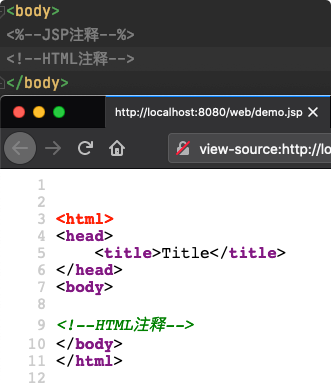
JSP表达式
用来将程序的输出,输出到客户端
<%=变量或者表达式%>
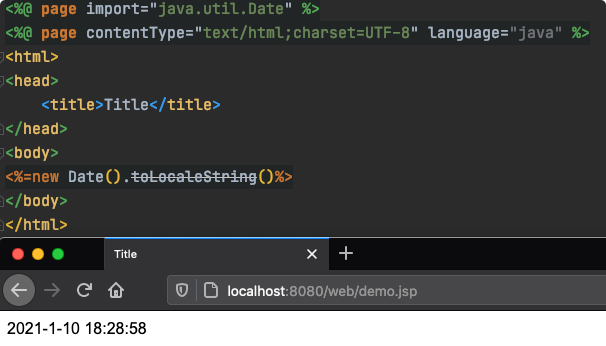
JSP脚本片段
<%
for (int i = 0; i < 10; i++) {
%>
<p>中间 <%=i%></p>
<%
}
%>
<%
out.print("脚本片段");
%>
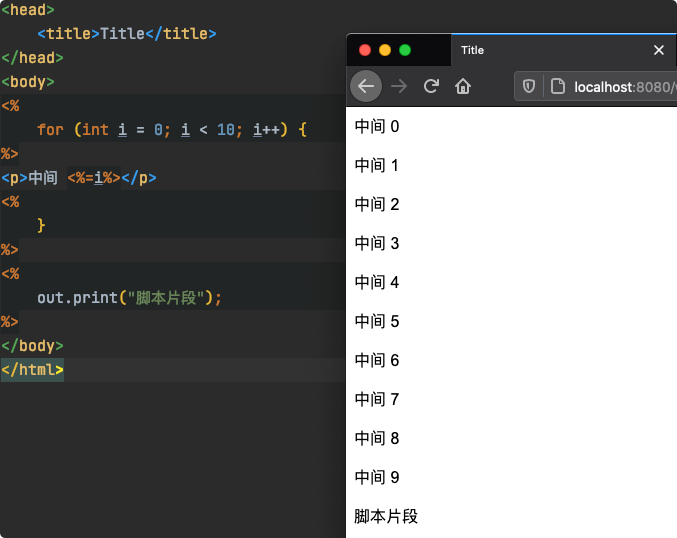
JSP声明
会被编译到JSP生成Java的类中!其他的,就会被生成到_jspService方法中
<%!
private int i = 10;
public void sayHello() {
// 不能调用out,不在同一个方法里
System.out.println(i);
}
%>
<%
sayHello();
%>
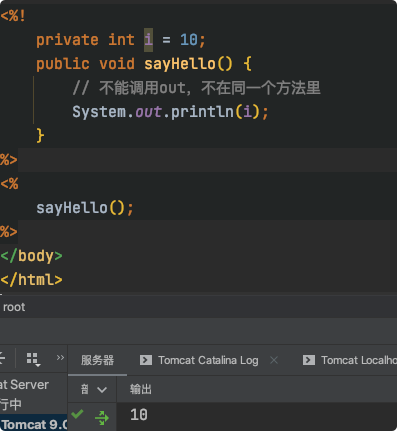
JSP指令
错误页面
指定页面
<%@ page errorPage="/error/500.jsp" %>
<%@ page isErrorPage="true" %>
指定代码
修改了web.xml就要重启tomcat
<!--错误代码定向页面-->
<error-page>
<error-code>500</error-code>
<location>/error/500.jsp</location>
</error-page>
导入其他页面
第一种
<body>
<%@ include file="/common/header.jsp"%>
<p>主体</p>
<%@ include file="/common/fotter.jsp"%>
</body>

第二种
作为第三方导入,变量命名不会冲突
<body>
<jsp:include page="/common/header.jsp"/>
<p>主体</p>
</body>

转发
转发页
<body>
<%
String URLEncodeStr1 = URLEncoder.encode("张三", "utf-8");
String URLEncodeStr2 = URLEncoder.encode("李四", "utf-8");
%>
<jsp:forward page="/test.jsp">
<jsp:param name="name1" value="<%=URLEncodeStr1%>"/>
<jsp:param name="name2" value="<%=URLEncodeStr2%>"/>
</jsp:forward>
</body>
接受页
<body>
<%
String URLEncodeStr1 = URLDecoder.decode(request.getParameter("name1"), "utf-8");
String URLEncodeStr2 = URLDecoder.decode(request.getParameter("name2"), "utf-8");
%>
<h1><%=URLEncodeStr1%></h1>
<h1><%=URLEncodeStr2%></h1>
</body>
创建对象设置属性
<body>
<jsp:useBean id="zhangsan" scope="page" class="com.demo.entity.Student" />
<jsp:setProperty name="zhangsan" property="id" value="1" />
<jsp:setProperty name="zhangsan" property="name" value="张三" />
<jsp:setProperty name="zhangsan" property="age" value="15" />
id:<jsp:getProperty name="zhangsan" property="id"/> <br/>
姓名:<jsp:getProperty name="zhangsan" property="name"/><br/>
年龄:<jsp:getProperty name="zhangsan" property="age"/><br/>
</body>
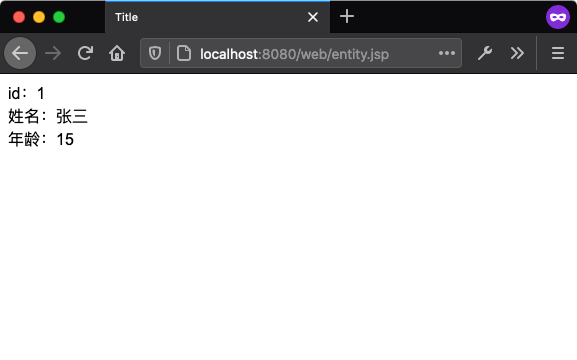
EL表达式
获取值,跟<%=%>差不多,好处在于可以省略getXXX获取值
<body>
<%
application.setAttribute("name", "张三");
Student student = new Student(1, "张三", 15);
pageContext.setAttribute("student", student);
%>
<h1>${pageScope.get("name")}</h1>
<h1>${requestScope.get("name")}</h1>
<h1>${sessionScope.get("name")}</h1>
<h1>${applicationScope.get("name")}</h1> <%--只能同级范围内取到值--%>
ID:${student.id} <br/>
姓名:${student.name} <br/>
年龄:${student.age} <br/>
</body>
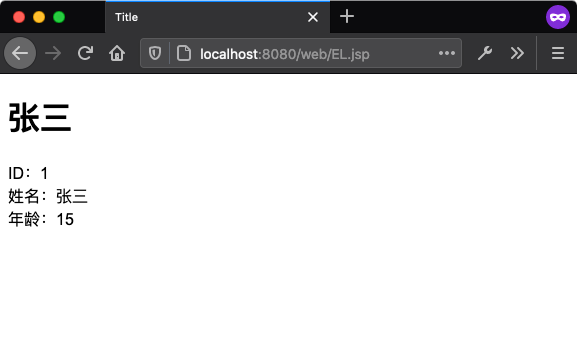
与JSP表达式的区别
一个是直接获取,一个从pageContext里拿:

JSTL表达式
核心标签库
<%@ taglib prefix="c" uri="http://java.sun.com/jsp/jstl/core" %>
<c:out>
用来显示一个表达式的结果,与<%= %>作用相似,它们的区别就是<c:out>标签可以直接通过"."操作符来访问属性
<body>
<%
String name = "张三";
%>
<c:out value="name" default="默认值"/> <br/>
<c:out value="<%=name%>" default="默认值"/> <br/>
<c:out value="${null}" default="默认值"/> <%--值为null时取默认值--%>
</body>

<c:set>
设置变量值和对象属性
<body>
<c:set var="name" value="张三" scope="page"/>
<c:out value="${pageScope.name}" default="默认值"/>
</body>
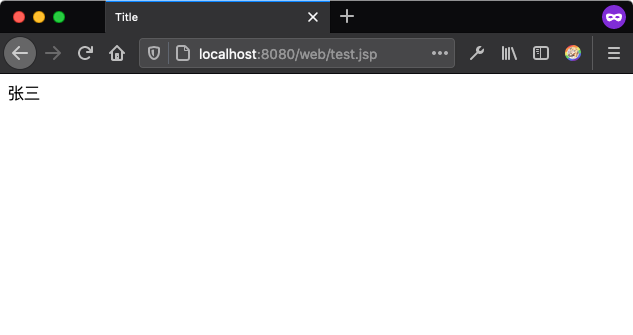
<c:remove>
用于移除一个变量,可以指定这个变量的作用域,若未指定,则默认为变量第一次出现的作用域
<body>
<c:set var="name" value="张三" scope="page"/>
<c:out value="${pageScope.name}" default="默认值"/> <br/>
<c:remove var="name" scope="page"/>
<c:out value="${pageScope.name}" default="默认值"/>
</body>

<c:catch>
主要用来处理产生错误的异常状况,并且将错误信息储存起来
<body>
<c:catch var ="catchException">
<% int x = 5/0;%>
</c:catch>
<c:if test = "${catchException != null}">
异常为 : ${catchException} <br/>
发生了异常: ${catchException.message}
</c:if>
</body>

<c:if>
<body>
<c:set var="salary" scope="page" value="${2000*2}"/>
<c:if test="${salary > 2000}">
<p>我的工资为: <c:out value="${salary}"/><p>
</c:if>
</body>
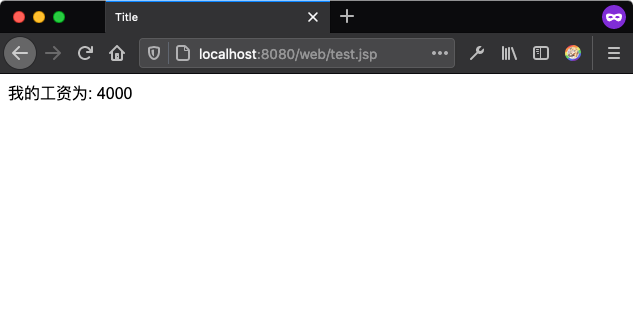
<c:chose>
与 if-elseif-else 类似
<body>
<c:set var="score" value="79" scope="page"/>
<c:choose>
<c:when test="${score>90}">
<h1>A</h1>
</c:when>
<c:when test="${score>80}">
<h1>B</h1>
</c:when>
<c:when test="${score>70}">
<h1>C</h1>
</c:when>
<c:otherwise>
<h1>D</h1>
</c:otherwise>
</c:choose>
</body>
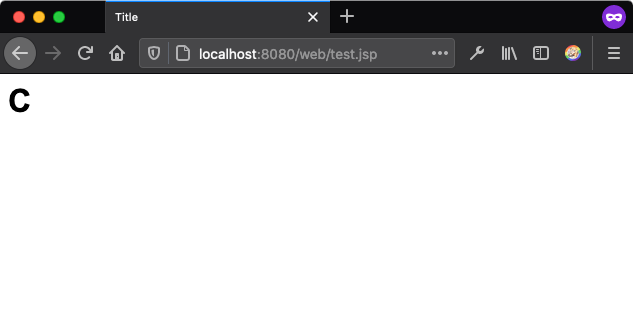
<c:when>
<c:choose>的子标签,用来判断条件是否成立
<c:otherwise>
<c:choose>的子标签,接在<c:when>标签后,当<c:when>标签都判断为false时被执行
<c:forEach>
<c:forEach var="i" begin="1" end="5" step="2">
Item <c:out value="${i}"/>
</c:forEach>
<%
int[] nums = {1, 2, 3, 4};
pageContext.setAttribute("nums", nums);
%>
<c:forEach items="${nums}" var="item" varStatus="status">
<p>num <c:out value="${item}"/> <c:out value="${status.index+1}"/></p>
</c:forEach>
